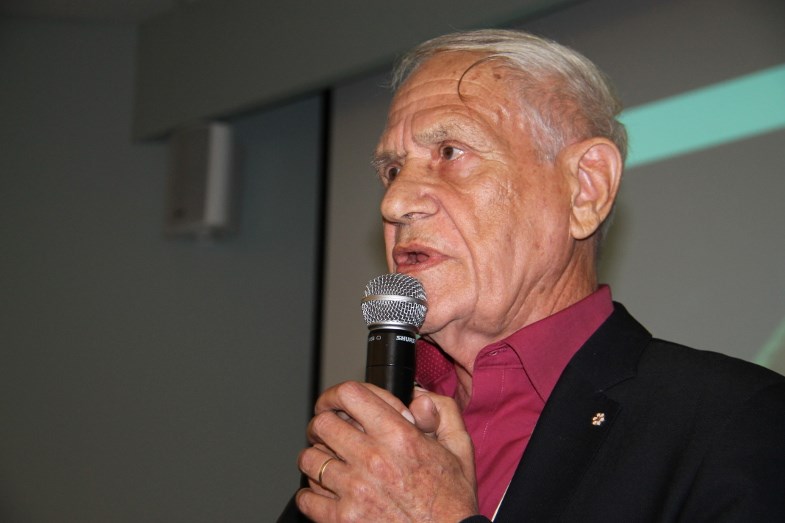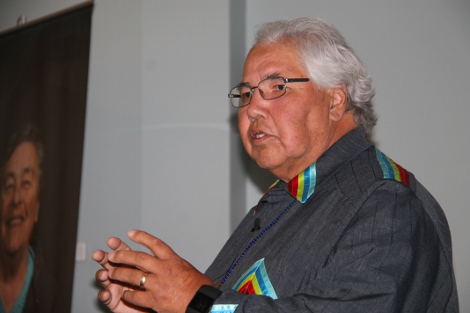The Canadian public has come to know much about the unpleasant truth of abuse inflicted on native children at residential schools over the course of several generations, but now, reconciliation in an atmosphere of mutual respect is crucial for both indigenous and non-indigenous people in order for Canada to move forward.
That was the message from Justice Murray Sinclair in a speech delivered Friday at Algoma University.
Celebrating Resilience: Youth Leading Change for Reconciliation is a series of cultural and educational events, spearheaded by youth, Shingwauk Kinoomaage Gamig (Algoma University’s indigenous education partner) and the Children of Shingwauk Alumni Association, taking place Friday through Sunday on the property of Algoma University and Shingwauk Kinoomaage Gamig.
“Many residential school survivors still remain angry…healing is going to take a long time,” Sinclair said.
However, Sinclair told Friday’s audience it is essential for survivors to move on and not pass hurt and anger down to future generations.
“I always say to survivors ‘this is no longer about you, it’s about your children and your grandchildren.’”
“We need to think about that.”
It is also essential for non-indigenous Canadian society to show respect for the indigenous population, Sinclair said.
“I say to the government, to the leaders of Canadian society, ‘it’s not about you, not even about your ancestors any more, it’s about your children and your grandchildren.’”
“They’re the ones who are going to have to pull together and figure out how they’re going to live together,” Sinclair said.
“We must inform and must inspire those young people who ‘get it’ (the concept of reconciliation).”
Sinclair, a native of the Selkirk, Manitoba area, is an aboriginal judge.
Sinclair was a gifted high school student who resisted pressure to take up a skilled trade and pressed on with his personal plans to attend university and forge a career in law.
He worked as a First Nations lawyer who made his mark for his representation of aboriginal people and his knowledge of aboriginal legal issues.
Sinclair was appointed Chair of Canada's Indian Residential Schools Truth and Reconciliation Commission in June 2009.
The Truth and Reconciliation Commission’s work, begun in 2008 by indigenous leaders and church groups, resulted in the TRC report, released in June 2015, with 94 "Calls to Action" to "redress the legacy of residential schools and advance the process of Canadian reconciliation.”
Another keynote speaker Friday was Douglas Cardinal, an exceptional architect whose work reflects aboriginal culture.
Cardinal, born in Alberta, is a Blackfoot who was subjected to harsh treatment in the residential school system.
He is best known for his design of the Canadian Museum of History in Gatineau, Quebec and the National Museum of the American Indian in Washington, D.C.
Cardinal recalled his first major architectural project was St. Mary’s Church, a Roman Catholic church in Red Deer, Alberta.
Reluctant at first to take on the project, as it reminded him of his residential school experience, Cardinal told Friday’s audience he decided to forge ahead with it.
“I realized how you deal with challenging things is to give back love and caring.”
“No matter what I went through with the Church, it was much more healing to give back love,“ Cardinal said.
“I put all my love and caring into that church, and it actually is my best work.”
Algoma University’s Great West Life Amphitheatre was filled with young and old, aboriginal and non-aboriginal, residential school survivors, First Nations leaders, municipal leaders, educators, students and the general public to hear Sinclair and Cardinal speak.
Celebrating Resilience: Youth Leading Change for Reconciliation activities continue Saturday and Sunday at Algoma University and Shingwauk Kinoomaage Gamig.
Admission is free.
Activities and events Saturday include an all-day art project led by Thinking Rock Community Arts, opening ceremonies at 9 a.m., followed by residential school history and intergenerational conversations, a youth panel, feast and comedy show with Ryan McMahon, a well-known aboriginal comedian.
Activities Sunday include breakfast at 8 a.m., followed by an opening circle at 9 a.m., an art project and youth presentations and conversations in the afternoon before closing ceremonies at 3 p.m. on the front lawn (weather permitting).
(PHOTO: Justice Murray Sinclair addresses an audience at Algoma University, July 31, 2015. Darren Taylor/SooToday)

